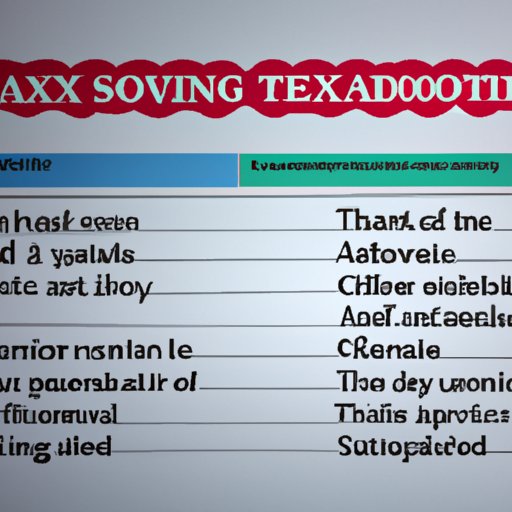Introduction
A Health Savings Account (HSA) is an account that allows individuals to save money on a tax-advantaged basis for qualified medical expenses. HSAs offer numerous benefits, including lower out-of-pocket healthcare costs and tax advantages. This article will provide a comprehensive guide to understanding what is a health savings account and how to maximize your savings with an HSA.
Comprehensive Guide to Understanding Health Savings Accounts
Before getting into the details of how to maximize your savings with an HSA, it is important to understand the basics of what an HSA is, who is eligible, and how they work.
What Is an HSA?
A Health Savings Account is a special type of savings account created by the U.S. government to help individuals pay for qualified medical expenses. It is similar to a 401(k), but for healthcare expenses. Money deposited into an HSA is not taxed as income, and it can be used to pay for certain medical expenses without incurring taxes. HSAs are typically offered in conjunction with high-deductible health insurance plans.
Who Is Eligible for an HSA?
To be eligible for an HSA, you must have a high-deductible health plan (HDHP) and no other health coverage. You cannot be enrolled in Medicare or be claimed as a dependent on someone else’s tax return. Additionally, you must be a U.S. citizen or a resident alien to open and contribute to an HSA.
How Does an HSA Work?
HSAs are simple to use. First, you select a provider and open an account. Then, you can make contributions to the account from your paycheck or from your own funds. The money you deposit in the account is not taxed and can be used for qualified medical expenses, such as doctor visits, prescription drugs, and dental care. Any unused funds remain in the account and roll over each year.
What Are the Benefits of an HSA?
There are many benefits to having an HSA, including lower out-of-pocket healthcare costs, tax advantages, flexibility, and portability. For those who qualify, HSAs can be a great way to save money and pay for medical expenses.

Exploring the Benefits of a Health Savings Account
An HSA can provide numerous benefits, including lower healthcare costs, tax advantages, and flexibility. Here is a closer look at these benefits.
Lower Healthcare Costs
One of the main benefits of an HSA is that it can help you reduce your out-of-pocket healthcare costs. With an HDHP, you will pay lower premiums than you would with a traditional health plan. However, you will also have higher deductibles and copayments. An HSA can help you cover those costs, allowing you to save money in the long run. According to a study by the Employee Benefit Research Institute, “On average, people enrolled in HDHPs with HSAs spent about $500 less on out-of-pocket costs than those enrolled in PPOs [preferred provider organizations] without HSAs.”
Tax Advantages
Another benefit of an HSA is its tax advantages. Contributions to an HSA are tax-deductible, meaning you can deduct them from your taxable income. Additionally, any interest or investment earnings on the money in your HSA are tax-free. Finally, withdrawals from the account for qualified medical expenses are also tax-free.
Flexibility and Portability
HSAs are also flexible and portable. You can withdraw money from your HSA for any qualified medical expense, regardless of where you live or work. Additionally, if you change jobs, you can take your HSA with you, making it a valuable asset when it comes to managing your healthcare costs.
Maximizing Your Savings with a Health Savings Account
Now that you know the basics of an HSA and its benefits, let’s take a look at how you can maximize your savings with an HSA.
Investing HSA Funds
One way to maximize your savings with an HSA is to invest the money in the account. Depending on your provider, you may be able to invest in stocks, bonds, mutual funds, and other investments. Investing your HSA funds can help you earn more over time, allowing you to save even more money.
Taking Advantage of Employer Contributions
In some cases, employers may offer to contribute to your HSA. If this is the case, take advantage of this opportunity to increase your savings. It’s also worth noting that employer contributions to an HSA are not subject to federal income tax.
Utilizing Other Resources
Finally, you can maximize your savings with an HSA by taking advantage of other resources. For example, you can use online tools to track your spending and compare prices on medical services. You can also use websites such as Healthcare Bluebook to find the best prices on healthcare services in your area.
What You Need to Know About Setting up a Health Savings Account
Once you’ve determined that you are eligible for an HSA, there are a few steps you need to take to get started.
Choosing an HSA Provider
The first step is to select an HSA provider. There are many providers to choose from, so it’s important to do your research and select one that meets your needs. Consider factors such as fees, investment options, customer service, and convenience.
Establishing an HSA
Once you’ve selected a provider, you will need to open an HSA. This process usually involves completing an online application and providing your Social Security number, date of birth, and other personal information.
Setting Up Withdrawals
Once your HSA is established, you will need to set up withdrawals. This is done by linking your HSA to your checking or savings account. When you need to withdraw money for a qualified medical expense, simply transfer the money from your HSA to your bank account.

How to Use a Health Savings Account for Maximum Savings
Once you’ve opened an HSA and set up withdrawals, you can start thinking about how to use the account for maximum savings. Here are some tips to keep in mind.
Prioritize Your Spending
When it comes to managing your HSA funds, it’s important to prioritize your spending. Make sure you are using the money for necessary medical expenses, such as prescriptions and doctor visits. It’s also a good idea to pay for preventive care, such as annual checkups, as these can help you avoid costly medical bills down the road.
Consider Your Long-Term Goals
It’s also important to consider your long-term goals when managing your HSA funds. Investing your HSA funds can help you build your savings over time, allowing you to prepare for future medical expenses.
Take Advantage of Online Tools
Finally, take advantage of online tools to manage your HSA funds. Many providers offer online tools and apps that allow you to track your spending and compare prices on medical services. Utilizing these tools can help you get the most out of your HSA.

An Overview of Tax Advantages of a Health Savings Account
As mentioned above, HSAs offer several tax advantages. Here is an overview of the tax advantages of an HSA.
Tax-Deductible Contributions
Contributions to an HSA are tax-deductible, meaning you can deduct them from your taxable income. This makes HSAs an attractive option for those looking to reduce their tax burden.
Tax-Free Interest and Investment Earnings
Any interest or investment earnings on the money in your HSA are also tax-free. This means that you can earn money on your HSA funds without having to worry about paying taxes on the earnings.
Tax-Free Withdrawals
Finally, withdrawals from an HSA for qualified medical expenses are tax-free. This means that you can withdraw money from your HSA for medical expenses without incurring taxes.
Conclusion
A Health Savings Account is a great way to save money on healthcare expenses. It offers numerous benefits, including lower out-of-pocket healthcare costs, tax advantages, and flexibility. By understanding the basics of an HSA and taking advantage of its benefits, you can maximize your savings and ensure long-term financial stability.
(Note: Is this article not meeting your expectations? Do you have knowledge or insights to share? Unlock new opportunities and expand your reach by joining our authors team. Click Registration to join us and share your expertise with our readers.)
